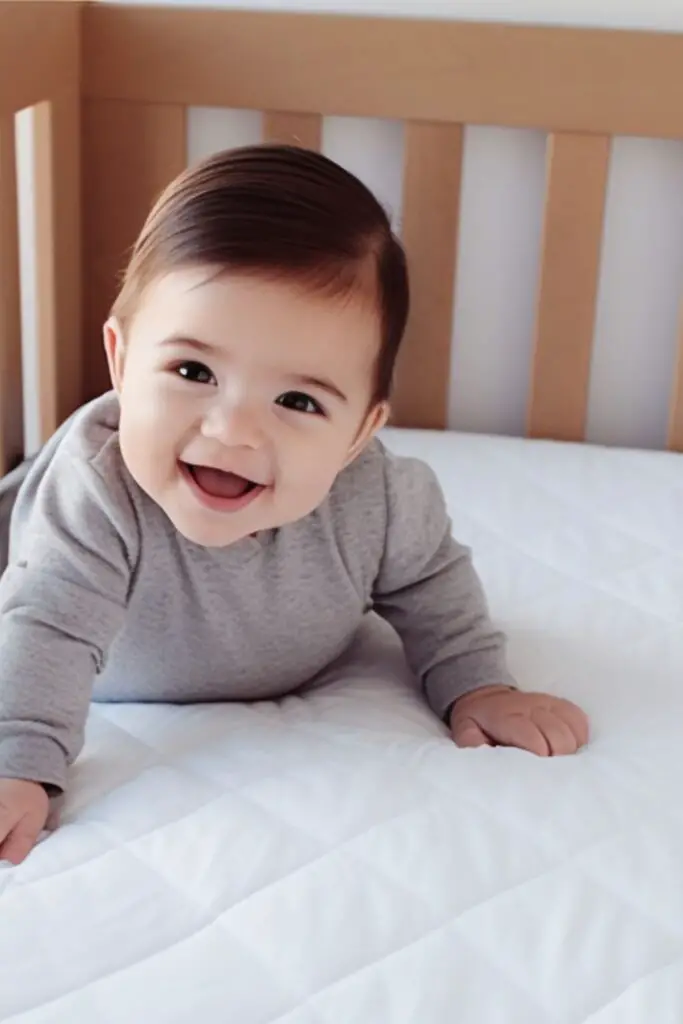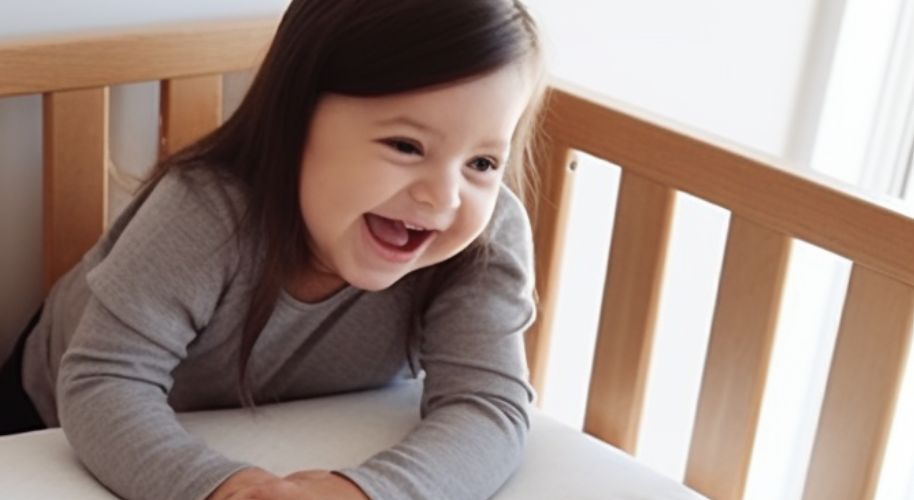Last Updated on June 5, 2025
A crib mattress is more than a simple accessory; it’s a sanctuary where your little one spends countless hours exploring dreamland. Given its importance, maintaining the cleanliness of this item is paramount. But how does one go about cleaning a crib mattress? The answer is more complex than you might think.
It requires care, attention, and techniques to ensure thoroughness and safety. In this blog post, we’ll delve into the art and science of crib mattress maintenance based on different sources and expert advice.
We’ll explore various methods ranging from using warm water and gentle detergent, hypoallergenic laundry soap, to natural alternatives like baking soda and vinegar. Let’s unravel the secrets to keeping your baby’s crib mattress clean, fresh, and inviting for those precious hours of sleep.

Why Should Clean Baby’s Crib Mattress?
Cleaning a baby’s crib mattress is crucial for several reasons. It helps ensure the baby’s health and safety. Babies spend a lot of time in their cribs, so it’s essential to keep this space as clean as possible to prevent exposure to harmful bacteria, dust mites, and allergens.
Regular cleaning can eliminate these potential hazards, reducing the risk of allergies and respiratory problems. A pediatrician, Dr. Sarah Potty, says, “Babies have sensitive skin and respiratory systems. Regularly cleaning crib mattresses reduces the risk of skin irritation and respiratory problems caused by dust mites and allergens.”
A clean mattress is key to maintaining good hygiene. Over time, a crib mattress can accumulate sweat, spit-up, diaper leaks, and other messes. If left uncleaned, these can lead to unpleasant odors and stains and potentially create an environment conducive to mold and bacteria growth.
“A clean crib mattress is not just about aesthetics—it’s about health. A mattress that isn’t regularly cleaned can become a breeding ground for bacteria and mold, which can lead to serious health issues,” says Jennifer Saxton, Founder & CEO of Tot Squad
Cleaning is particularly important if you have a used crib mattress. Used mattresses may carry unknown contaminants or allergens, so thoroughly cleaning them before use is advisable.
If your crib mattress has a waterproof surface, cleaning is necessary to maintain this feature. However, avoid using harsh chemicals or bleach that may damage the waterproof coating.
How To Clean Crib Mattress?
Cleaning a crib mattress is essential to ensure the health and hygiene of your baby’s sleep environment. Here’s how you can do it effectively:
Scrub with Warm Water and Gentle Detergent
Begin by scrubbing the mattress with warm water and a gentle detergent. Ensure to thoroughly wipe off the detergent from the mattress afterward to ensure no residue is left behind.
Use Hypoallergenic Laundry Detergent for Baby Bedding
The safest way to clean baby bedding is by washing it in the machine using unscented, hypoallergenic laundry detergent. This type of product eliminates potential allergens without introducing strong scents that could disturb your baby’s comfort.
Apply Rubbing Alcohol
You can use a spray bottle to apply rubbing alcohol to the surface of the crib mattress. The mattress will not need to be rinsed, as the alcohol will evaporate, leaving the mattress sanitized.
Wipe with a Damp Cloth and Mild Soap
If your crib mattress has a waterproof surface, avoid using harsh chemicals or bleach that may harm the waterproof surface coating. Instead, use a damp cloth and mild soap to clean the mattress.
Use a Solution of Warm Water and Laundry Detergent/Washing Powder
For a thorough clean, you can make up a solution of five cups of warm water and a tablespoon of laundry detergent/washing powder. Make sure the detergent contains no bleach.
Remove Stubborn Stains with a Mix of Water and White Vinegar
To deal with stubborn mattress stains, pour an equal mix of water and white vinegar into a spray bottle and apply it to the stains.
You Might also Like These Resources!
- When Your Baby Has Outgrown the Bassinet but Isn’t Ready for a Crib
- Neatly Folding Crib Sheets: A How-To Guide
- Raising the Crib Mattress for Comfort and Safety
Natural Alternatives for Cleaning

Cleaning your home or personal items doesn’t necessarily mean using harsh chemicals. Many natural alternatives can be just as effective and safer for you and the environment. Here are some suggestions:
Vinegar
One of the most versatile natural cleaners, vinegar is acidic, which helps it to break down dirt, grease, and grime. It’s ideal for cleaning windows, countertops, and bathroom fixtures.
Baking Soda
Baking soda is great for removing tough stains and odors. It works well for scrubbing sinks, bathtubs, and even the inside of your oven.
Lemon Juice
Lemon juice is another effective natural cleaner due to its acidity. It’s excellent for shining brass and copper, and when mixed with vinegar or baking soda, it creates a potent cleaning paste.
Olive Oil
This isn’t just for cooking! Olive oil can be used to polish wood furniture and stainless steel.
Hydrogen Peroxide
A great natural bleach alternative, hydrogen peroxide can be used for laundry, cleaning grout, and disinfecting surfaces.
Essential Oils
Besides a pleasant smell, many essential oils have antibacterial and antiviral properties. Tea trees, eucalyptus, and lavender oils are especially effective.
Castile Soap
This plant-based soap is biodegradable and gentle, perfect for various cleaning tasks, from washing dishes to cleaning floors.
Always remember, before using a new cleaning product — even a natural one — test it on an inconspicuous area first to ensure it doesn’t discolor or damage the surface.
Caring for the Waterproof Surface Coating
Caring for the waterproof coating on items like crib mattresses, raincoats, or outdoor equipment requires specific cleaning methods to maintain efficacy. Here are some steps to guide you:
Avoid Harsh Chemicals
Harsh chemicals, bleach, or abrasive cleaning tools can damage the waterproof coating. Instead, use mild soaps, detergents, soft cloths, or sponges for cleaning.
Clean Regularly with Mild Soap
Use a mild soap and warm water to clean the surface regularly. This will help remove dirt and stains without damaging the waterproof coating.
Rinse Thoroughly
After cleaning, rinse the item thoroughly to remove all soap residues. Any leftover soap can leave a film on the waterproof surface that reduces its effectiveness.
Air Dry
Allow the item to air dry completely after cleaning. Using a dryer or direct heat can damage the waterproof coating.
Reapply Waterproofing Agent If Needed
Over time, the waterproof coating may wear off. If you notice that water is no longer beading on the surface, it may be time to reapply a waterproofing agent. Be sure to choose a product suitable for the material you’re working with.
By following these steps, you can help maintain the waterproof properties of your items, extending their lifespan and effectiveness.
What if the crib mattress has a musty smell?
If your crib mattress smells musty, it could indicate mold or mildew. These fungi thrive in damp environments and can have potential health risks. To address this, vacuum both sides of the mattress to remove loose spores, then clean with vinegar and warm water.
After cleaning, ensure the mattress is completely dry before using it again to prevent mold regrowth. If the musty smell persists after thorough cleaning and drying, consider replacing the mattress to safeguard your child’s health.
FAQs
Is it safe to use a steam cleaner on the crib mattress?
Steam cleaning can be a great way to sanitize the mattress, but be sure it dries thoroughly afterward.
How do I clean a foam crib mattress?
Foam mattresses should not be soaked. Instead, spot-clean them with mild detergent and warm water.
Can I vacuum the crib mattress?
Yes, vacuuming can help remove dust mites and allergens from the surface of the mattress.
Finally,
The cleanliness of a child’s pure mattress is not only for visual appeal. It’s equally important for your little one’s health and safety, says Jennifer Saxton. Regular cleaning can prevent the build-up of harmful bacteria, allergens, and dust particles that can affect your baby’s respiratory health and overall well-being, which Dr. Robert S. Boxer said.
Moreover, it can also prolong the mattress’s lifespan, making it a cost-effective practice. So, make it a habit to regularly clean your baby’s crib mattress because a clean crib equals a healthy, happy baby.
You Might Also Like These Latest Content!
- Removing Poop Stains from Your Bathtub
- Cleaning Your Bassinet: A Comprehensive Guide
- Fun and Games: How to Play Diaper Pong

Amy A. Vincent is a Certified Pediatric Sleep Consultant and a mother of three beautiful children. She helps parents transition their babies from swing sleep to safe, independent sleep. She is passionate about helping parents teach their children the skills needed to become good sleepers and aims to make the process as easy and stress-free as possible. Read more
